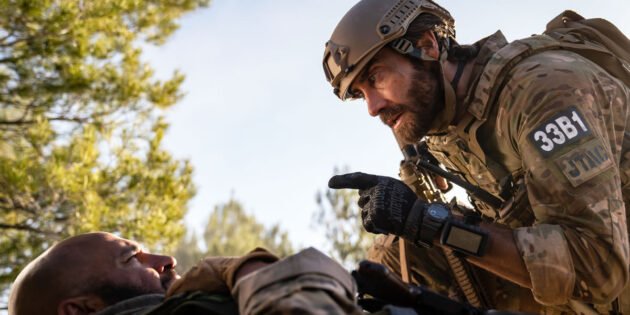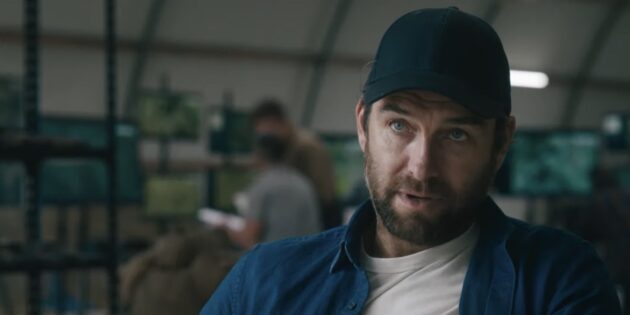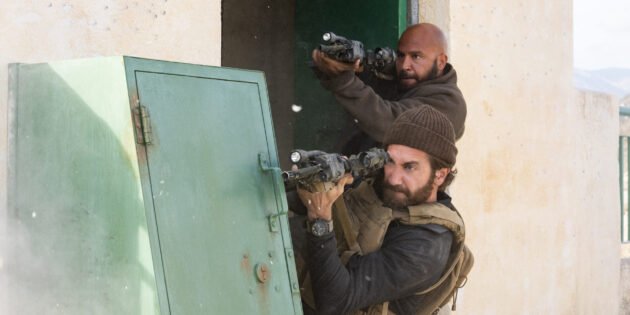On June 1, the Russian premiere of Guy Ritchie's new film, the second in a year, took place. Due to the pandemic, the timing of the premieres has shifted, so that the director's schedule looks even indecent.
The original The Covenant can be translated as "Covenant", but Russian distributors settled on "Translator" — more sonorous and understandable. However, Guy Ritchie's films were not called as soon as possible, so it's okay.
Guy Ritchie is a master of comedy thrillers about petty criminals. This is how he is perceived, even despite such paintings as "Aladdin", "Sherlock Holmes", "Agents of A.N.K.L.", "King Arthur's Sword", which can hardly be put on a par with "Big Money" and "Cards, money, two barrels". "The Translator" is the first military drama in the director's career, and definitely his most daring film. It's even amazing that it turned out so good.
Richie co—wrote the script with Ivan Atkinson and Marn Davis - these are the director's old partners with whom he worked on a lot of films. The role of the composer was again played by Christopher Benstead — this is the fourth picture of Richie released to his music. But the operator is new — it became Ed Wilde.
2018. American John Kinley is serving in Afghanistan, where he leads a detachment that identifies Taliban cells. Together with his colleagues, the soldier is ambushed, where he is wounded. The only survivor, apart from Kinley, is a local man, Ahmed, who works for him as a translator. Ahmed saves a soldier's life by dragging him to the American military. When John wakes up in the USA, he finds out that Ahmed stayed in Afghanistan because he was not granted a visa, and now the Taliban is hunting for him. The American decides that he is obliged to save the translator.
The last four films of Richie were shot by cameraman Alan Stewart. He did not reinvent the wheel, working within the genre requirements — it turned out fine, but it was too simple and understandable. For the "Translator" Richie chose Ed Wilde, and this is a great solution.
Not the most popular cameraman (Wilde shoots TV series more often than films) demonstrates his versatility from the first frames. From drone shots to a mobile hand—held camera, from brilliant landscape plans to large-scale shots - I am glad that excellent mastery of technology is combined with a sense of rhythm. The case when everything is not only high-quality, but also on time.

Despite the fact that Wilde works superbly in every scene, landscapes are the most surprising. In the movie, Richie admires the brook. A year ago it would have sounded like nonsense and a sick fantasy, but now it happens. For the first time, one can talk about the director's picture from the point of view of poetics. Maybe by the age of 54, Richie finally found his cameraman — this is real chemistry.
Despite some problems, the "Translator" is able to touch. The sentimentality that permeates the entire film is sustained by acting and music.
In the first case, we are talking about a rather impressive, almost silent pain, which is demonstrated by a detached look and nods instead of unnecessary words. If John is dissatisfied with something in the USA, he starts shouting and threatening. In war, all his emotions are concentrated in looking at two thousand yards — he feels horror that cannot be put into a scream. Both Jake Gyllenhaal and Dar Salem convey the state of their heroes without excessive expression. But the melodies are much more eloquent.
In The Translator, Bensted reveals himself as a master of sensitive and timely melodies that do not so much add emotions as rediscover what is happening on the screen. The music is mixed with pain, despair, fear, anxiety, but despite such openness, it does not turn into kitsch. Brilliant work.
If outwardly the "Translator" is great, then some internal elements raise questions. For example, it does not explain in any way that the main character, an American, forgot in Afghanistan at all. The viewer gets only a given — here is a daredevil, whom everyone respects, and he leads the soldiers. It is unknown why he is here.
On the one hand, this move allows you to abstract from a specific war and make history more universal. On the other hand, the motives of the heroes are lost. What is John Kinley doing in Afghanistan? Is he a patriot who believes that it is necessary to defend the country while in another state? Or is he just following orders?
As the film progresses, the lack of answers to these questions begins to get in the way. For example, there is a juxtaposition of a soldier of the US Armed Forces and a mercenary from the PMCs. If you figure it out, then they are both fighting in a foreign country for money — what is the fundamental difference? If only a little more was known about Kinley, then perhaps the question would have disappeared by itself.

The internal structure of Afghanistan is explained by the credits at the beginning of the film, and then chaos begins. Now the Taliban controls everything, then it controls nothing. One is able to find a person in a day, the other is not able to do it for months.
Yes, Richie concentrates on the main characters, but it's as if he constantly misses the world that surrounds them. Because of this, the plot suffers. Fortunately, The Translator is too good to worry about plot holes, but it would be even better without them.
Already from the first scene, which strongly resembles the beginning of "Apocalypse Now", it becomes clear what territory Richie has entered. In fact, this is a military drama that reveals the inner world of a person who finds himself in hell.
Then it begins to seem that war is a disguise for a standard Richie movie. Like, if you move the story to London, the police will just fight the ruthless mafia. There is also a rude humor inherent in the films of the Briton. However, it quickly turns out that jokes are needed only to show the relationship of soldiers, jokes are just proof of their closeness.
Perhaps this is the first film in which Richie the director is noticeably superior to Richie the screenwriter. The Briton has long moved away from the logocentric paintings of the late 90s and the noughties, experimenting with genre canons, but never entered the territory of military cinema. And then it turned out that Richie brilliantly chooses both rhythm and compositions, and squeezes drama out of the actors — not cheap, but existential. Finally, we see the real Gyllenhaal, the superstar of the last decade, who has been acting in passing projects in recent years.
Richie also refuses (almost) genre cliches. Yes, he left a couple of impressive battle scenes, adding heroism to the characters, but they don't personify the film. It's even interesting to look at the training camps in Russia. Guy Ritchie is a man who should have been awarded the People's Artist award a long time ago: they really love him for comedies about petty criminals. But how will the fan base react to another, extremely serious Richie?

It seems that the only conclusion that can be drawn from the ending and the credits is that everyone lost in this war. And Ahmed, who was born at the wrong time and in the wrong place, and John Kinsley, who got involved in it of his own free will. It is surprising and strange to see in Guy Ritchie's film an anti-war message and a condemnation of violence. It turned out to be not perfect, but still an impressive drama.